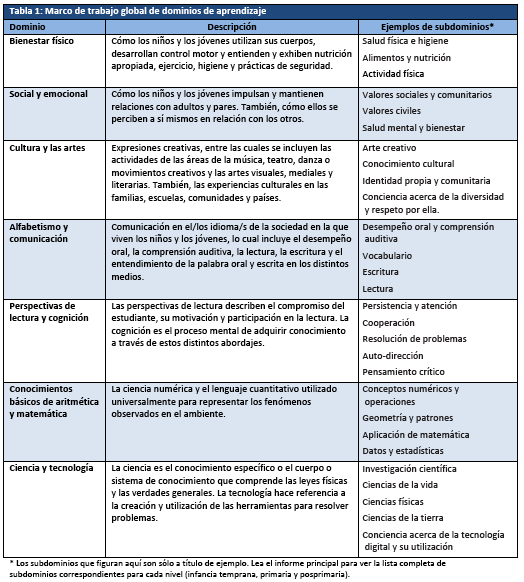Justo en el momento en que un grupo de colegas publica una carta abierta criticndo los usos del SIMCE y declarando llegado el “momento de abrir el debate sobre el actual Sistema de Medición de la Calidad y en lo que ha devenido”, la UNESCO a través de su Instituto de Estadístca conjuntamente el Center for Universal Education (CUE) at the Brookings Institution han reunido una Learning Metrics Task Force (LMTF), cuyo objetivo es: “to shift the focus of global education debates from access to access plus learning. Based on input from technical working groups and global consultations, the task force will make recommendations to help countries and international organizations measure and improve learning outcomes for children and youth worldwide”.
Nada más oportuno, entonces, que leer este informe que llama a reforzar el uso de mediciones inteligentemente diseñadaas para medir el avance de los aprendizajes en siete dominios claves:
Ver el resumen ejectivo del informe en castellano aquí <pdf>
Toward Universal Learning: Recommendations from the Learning Metrics Task Force
Primary school enrollment rates have risen dramatically over the past 15 years, but, those gains have been uneven and learning levels remain unacceptably low. Poor quality education is jeopardizing the future of millions of children and youth around the world. Yet we do not know the full scale of the crisis because measurement of learning outcomes is limited in many countries, and hence difficult to assess at the international level.
Motivated by the challenges of low learning levels and a global data gap on learning, 30 organizations have joined efforts through the Learning Metrics Task Force with the ultimate goal of improving learning experiences for children and youth around the world. Convened by the UNESCO Institute for Statistics and the Center for Universal Education at the Brookings Institution, the task force works within the Millennium Development Goals (MDG), Education for All (EFA), and Global Education First Initiative (GEFI) and contributes to their fulfillment by:
• Catalyzing a shift in the global education conversation from access to access plus learning.
• Building consensus on global learning indicators and actions to improve the measurement of learning in all countries.
With input from more than 1,700 individuals in 118 countries, the task force has developed a series of recommendations to use both existing assessments of learning and innovative, new measures to improve the opportunities and outcomes of all children.
The final recommendations from the task force are presented in this report, entitled Toward Universal Learning: Recommendations from the Learning Metrics Task Force, which outlines how the measurement of learning outcomes can help to ensure quality education for all. It presents key indicators for tracking progress in foundational skills such as literacy and numeracy, as well as in knowledge and skills that go beyond these traditional indicators. In particular, the task force calls for new global indicators to include “readiness to learn” in early childhood, skills and values for youth to be successful “citizens of the world,” and a “learning for all” indicator that would combine measures of access, completion and reading into one statistic. It also calls for a simple global tool to examine the breadth of learning opportunities to which children and youth are exposed through education.
Bajar un folleto sobre el estudio en cuestión aquí <pdf>
Bajar el texto del informe (en inglés) completo aquí <pdf>


0 Comments